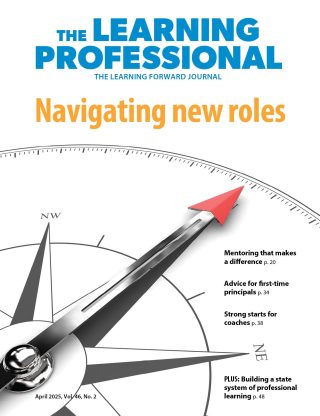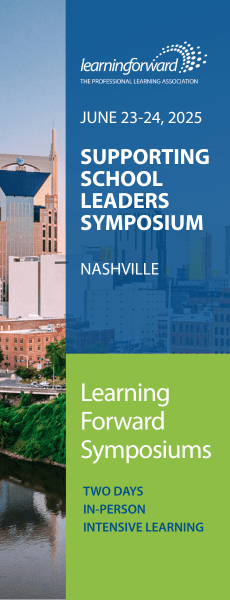FOCUS
The DNA of development
A new model for school change focuses on adult learning
By Eleanor Drago-Severson and Jessica Blum-DeStefano
June 2018
Vol. 38 No. 3
Read the remaining content with membership access. Join or log in below to continue.
Sed ut perspiciatis unde omnis iste natus error sit voluptatem accusantium doloremque laudantium, totam rem aperiam, eaque ipsa quae ab illo inventore veritatis et quasi architecto beatae vitae dicta sunt explicabo. Nemo enim ipsam voluptatem quia voluptas sit aspernatur aut odit aut fugit, sed quia consequuntur magni dolores eos qui ratione voluptatem sequi nesciunt. Neque porro quisquam est, qui dolorem ipsum quia dolor sit amet, consectetur, adipisci velit, sed quia non numquam eius modi tempora incidunt ut labore et dolore magnam aliquam quaerat voluptatem.
References
Donaldson, G.A. (2008). How leaders learn: Cultivating capacities for school improvement. New York, NY: Teachers College Press.
Drago-Severson, E. (2009). Leading adult learning: Supporting adult development in our schools. Thousand Oaks, CA: Corwin.
Drago-Severson, E. (2012). Helping educators grow: Strategies and practices for leadership development. Cambridge, MA: Harvard Education Press.
Drago-Severson, E. & Blum-DeStefano, J. (2016).Tell me so I can hear you: A developmental approach to feedback for educators. Cambridge, MA: Harvard Education Press.
Drago-Severson, E. & Blum-DeStefano, J. (2018).Leading change together: Developing educator capacity within schools and systems.Alexandria, VA: ASCD.
Drago-Severson, E., Blum-DeStefano, J., & Asghar, A. (2013). Learning for leadership: Developmental strategies for building capacity in our schools. Thousand Oaks, CA: Corwin.
Ingersoll, R., Merrill, L., & Stuckey, D. (2014). Seven trends: The transformation of the teaching force. CPRE Report #RR-80. Philadelphia, PA: Consortium for Policy Research in Education, University of Pennsylvania.
Kegan, R. (2000). What “form” transforms? A constructive-developmental approach to transformative learning. In J. Mezirow & Associates (Eds.), Learning as transformation(pp. 35-70). San Francisco, CA: Jossey-Bass.
Kegan, R. & Lahey, L.L. (2016).An everyone culture: Becoming a deliberately developmental organization.Boston, MA: Harvard Business Review Press.
Leithwood, K. & Louis, K.S. (2012). Linking leadership to student learning.San Francisco, CA: Jossey-Bass.
Meier, D. (2002).The power of their ideas: Lessons for America from a small school in Harlem. Boston, MA: Beacon Press.
School Leaders Network. (2014). Churn: The high cost of principal turnover.Hinsdale, MA: Author.
Jessica (jblumdestefano@bankstreet.edu) is course instructor & advisor, Bank Street Graduate School of Education.
Recent Issues
LEARNING DESIGNS
February 2025
How we learn influences what we learn. This issue shares essential...
BUILDING BRIDGES
December 2024
Students benefit when educators bridge the continuum of professional...
CURRICULUM-BASED PROFESSIONAL LEARNING
October 2024
High-quality curriculum requires skilled educators to put it into...
LEARNING TO PIVOT
August 2024
Sometimes new information and situations call for major change. This issue...












